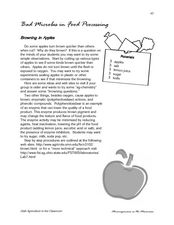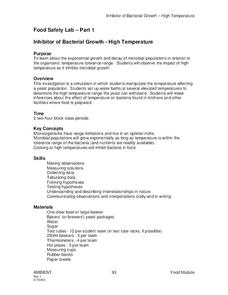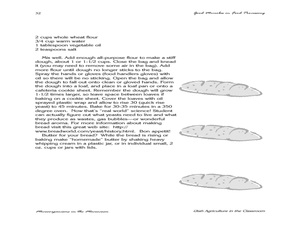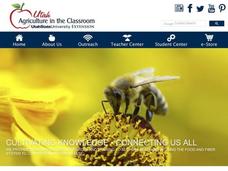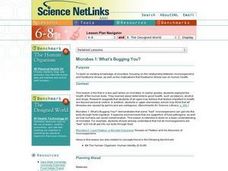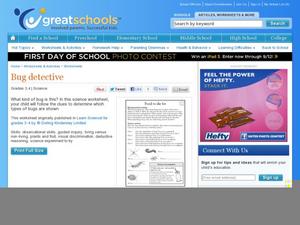University of Rhode Island
Food Safety Smart Curriculum
This is a must-have resource with everything you'll need for studying food safety with your pupils. From handwashing scorecards and cleaning kitchen surfaces to navigating the world of microbes and food-borne illnesses, here you'll...
Curated OER
Bad Microbes in Food Processing
Students complete an experiment to determine if there are bad microbes in food processing.In this bad microbe experiment, students use apples to see how they react to oxygen. Students test apples with chemicals to observe the changes.
Curated OER
Food Safety Lab
High schoolers determine the optimal living conditions for yeast and apply these results to microbes in food. For this microbiology lab lesson, students observe the reaction of yeast to elevated temperatures. They relate these results to...
Curated OER
Microbes
Microbiology beginners feed different sweetening agents to yeast and measure carbon dioxide production to estimate energy contained in each. They set the trials up in zip-top plastic baggies and then measure gas volume by water...
Curated OER
Good Microbes in Food Processing
Young scholars participate in a bread making experiment to understand the good microbes in bread. In this bread making lesson, students prepare bread in a bag with varied recipes and note results.
Curated OER
An Introduction to Microbes - Biology Teaching Thesis
Students are able to define microbes and identify the five main groups of microbes. They are able to give examples of ways in which microbes have impacted or currently impact human life. Students are able to explain that not all microbes...
Baylor College
The Variety and Roles of Microbes
Mini microbiologists play a card game in which they group microorganisms by groups: virus, fungus, protist, or bacteria. Then they identify the roles different microbes play in the natural world and explore how humans effectively use...
Curated OER
Microbe Experimentation
Sixth graders formulate a question about microorganisms that can be answered with an experiment. They develop a hypothesis for a questin about microorganisms based on observations and prior knowledge. Pupils carry out an investigation on...
Curated OER
Hazards of Defrosted Food
Peas spoilage hot, peas spoilage cold: examine the bacterial growth on newly defrosted peas versus peas that have been defrosted for 24 hours. Using the session one questions in the "Microbes and Food Spoilage" PDF, learners will make...
Centers for Disease Control and Prevention
Teach Mrs. Jones' Class about Microbes
During a biology lesson, scholars research microbes, design a lesson plan using an outline, and present the lesson to the class.
University of Waikato
Growing Soil Microbes
View how microbes grow in soil. Class members first create a Winogradsky column to grow bacteria. They then set up the column of mud in a plastic bottle and include a food source for the microbes and observe the column of mud over the...
American Museum of Natural History
Gusty: The Gut Microbiome Card Game
Build up your gut. Groups up to four play a card game to learn more about the microbiome in the gut. Learners try to build a healthy gut with their cards. The player acquiring six microbes without any pathogens wins the game.
Curated OER
The good microbes
The question posed for the class to consider; What would decay and what would not? They read the short passage on decomposition and microbes, then mark the items that would decay after a two-week period. A scientific investigation idea...
Curated OER
The Good Microbes
Some microbes are beneficial for humans. This resource asks learners to identify beverages that contain healthy microbes. There are six beverages shown, and pupils must place a check mark next to the ones they think contain healthy...
Curated OER
A Safe Food Supply? Is Your Food Safe to Eat?
Viewers of this slide show learn that pesticides used on food crops can be harmful, but that there are certain allowable levels that should not be hazardous. They find out the rigorous process of inspection that meat must go through...
Nuffield Foundation
Microbes Ate My Homework
Now you have a new excuse not to do your homework. A long-term experiment has learners explore cellulose-digesting enzymes. They simulate how paper breaks down in a compost bin. There's no need to blame your dog for eating your homework...
Learning Games Lab
How to Use Oil Immersion Microscope
Teach the class how to use a microscope to identify bacteria in food. Scholars explore the different parts of the microscope and learn how to determine total magnification. They walk step-by-step through the procedure of preparing slides...
Curated OER
Chapter 16, Food Biotechnology
Although the points given on these slides are valid, the visual accessibility is poor. Consequently, many viewers would be distracted or entirely unable to view the presentation. The content is a review of microorganisms and their...
Curated OER
MICROBES 1: WHAT'S BUGGIN YOU?
Students use existing knowledge of microbes, focusing on the relationship between microorganisms and foodborne illness, as well as the implications that foodborne illness has on human health.
Curated OER
Water Microbes and Human Health
Students research the possible sources and human health effects of microbes found in recreational and drinking water. They explore the range of negative outcomes of contact with contaminated recreational and drinking water by creating...
Curated OER
Food Safety
In this science worksheet, learners read the brochure that is concerned with the concept of food safety. The dangers and advantages are discussed.
Curated OER
All About Germs
How do people get sick? Youngsters explore the world of germs and microbes with a lab sheet and science investigation. After identifying the unhygenic practices in a picture of a kitchen, fifth graders conduct an experiment with bread...
Curated OER
Bug Detective
What happens when a living thing dies? After reading a paragraph of background knowledge on the life cycle of bugs, third and fourth graders work through four clues to figure out which bug is which. When they finish, they can study the...
Curated OER
Microbes and Our Food
Students investigate foodborne illnesses and involved microbes. They identify major pathogens and then research and explain how they contaminate foods and how people are affected.



